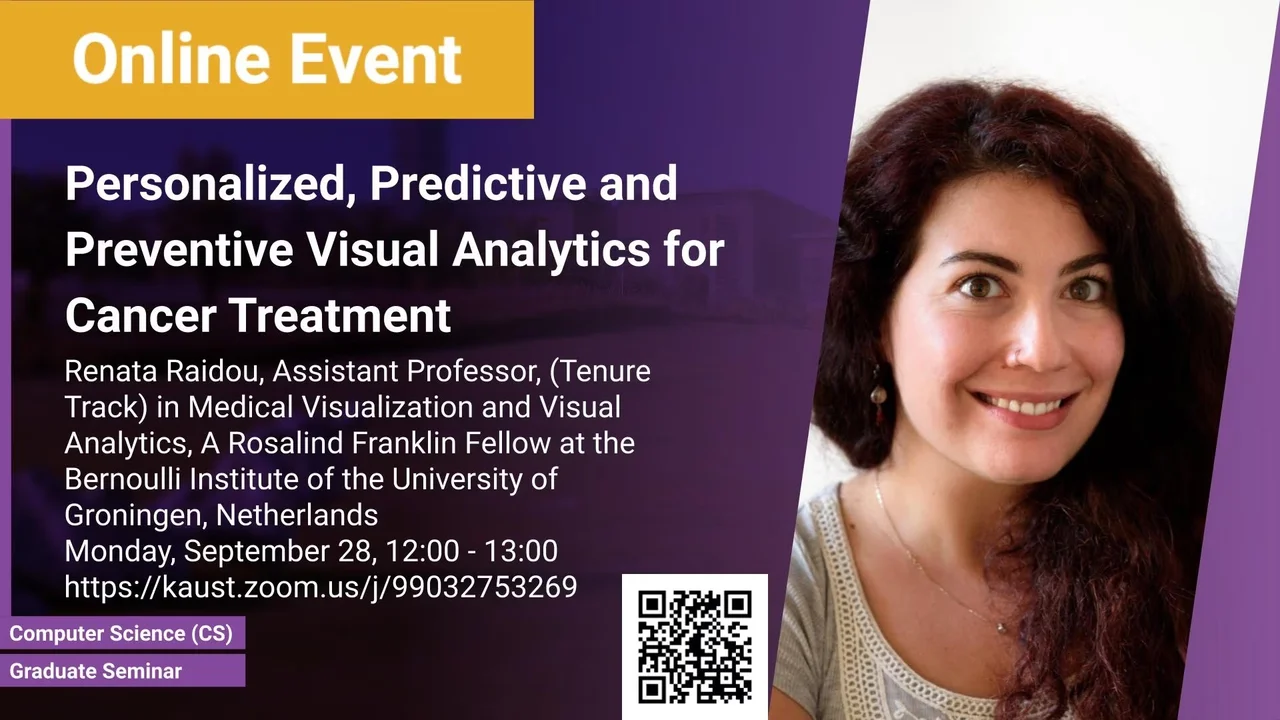
Personalized, Predictive and Preventive Visual Analytics for Cancer Treatment
- Renata Raidou, Assistant Professor (Tenure Track) in Medical Visualization and Visual Analytics, and a Rosalind Franklin Fellow at the Bernoulli Institute of the University of Groningen, Netherlands
KAUST
The term P4 medicine has been coined almost a decade ago to indicate novel ways of early detection and prevention of diseases. P4 stands for personalized, predictive, preventive, and participatory, to indicate that a diagnosis or treatment is tailored to each individual patient, risk factors are identified early and addressed before manifestation, and individuals are actively involved into all processes. Often, P4 approaches are accompanied by the acquisition of large and complex medical imaging data, and demanding computational processes–especially, when it comes to cancer radiotherapy, which is a data heavy and visual computing rich process.
Overview
The term P4 medicine has been coined almost a decade ago to indicate novel ways of early detection and prevention of diseases. P4 stands for personalized, predictive, preventive, and participatory, to indicate that a diagnosis or treatment is tailored to each individual patient, risk factors are identified early and addressed before manifestation, and individuals are actively involved into all processes. Often, P4 approaches are accompanied by the acquisition of large and complex medical imaging data, and demanding computational processes–especially, when it comes to cancer radiotherapy, which is a data heavy and visual computing rich process.
Conventional automatized computational solutions would not be sufficient for exploration and hypothesis generation purposes in radiotherapy cancer treatment, as there is one essential aspect that cannot be easily incorporated: the prior knowledge and cognitive skills of the involved clinical experts. Yet, the field of visual analytics can facilitate interactive data exploration and analysis and provide a deeper cognitive insight for the intended users. Involving clinical experts through visual analysis and interaction in the workflow of radiotherapy, its personalization, and predictive/preventive aspects had never been tackled before.
In my talk, I will discuss recent developments in the domain of visual analytics to support the personalization, predictiveness and prevention aspects of treatment in prostate cancer radiotherapy, empowering the intended clinical researchers to derive information from their high-dimensional complex data, to understand the newly discovered knowledge, and to formulate or confirm hypotheses with respect to their observations and findings, creating a fertile ground for future clinical research and opening new possibilities for patient treatment.
Click here to view the slides.
Brief Biography
Renata Raidou is Assistant Professor (Tenure Track) in Medical Visualization and Visual Analytics, and a Rosalind Franklin Fellow at the Bernoulli Institute of the University of Groningen, in the Netherlands. She received her M.Sc. degree in Biomedical Engineering from Delft University of Technology in 2012, and her Ph.D. degree from Eindhoven University of Technology in 2017. The topic of her dissertation was “Visual Analytics for Digital Radiotherapy: Towards a Comprehensible Pipeline”, for which she received the Dirk Bartz Prize for Visual Computing in Medicine at Eurographics 2017, and the Best PhD Award 2018 of the Eurographics Awards Programme. Until September 2020, she has been a Post-Doc researcher at the Institute for Visual Computing and Human-Centered Technology at TU Wien. Her research is on the interface between Visual Analytics, Image Processing and Machine Learning, with a strong focus on medical applications. Her expertise is in Comparative Visual Analytics and Uncertainty Visualization. For more information visit: https://renataraidou.com/
